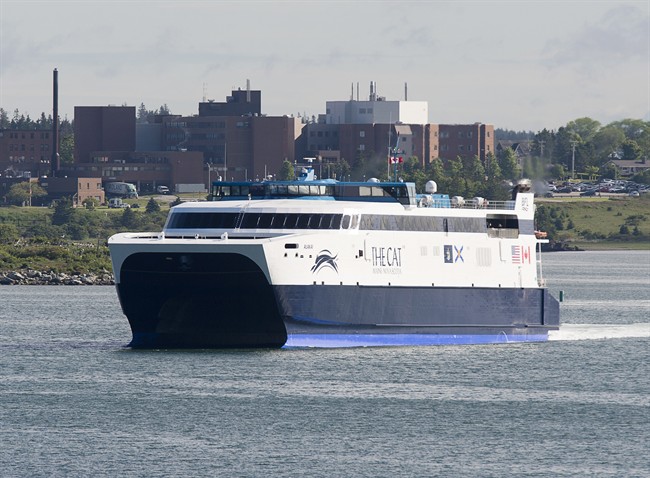The plan to move a Nova Scotia high-speed ferry’s American port of call could be dead in the water with the United States Customs and Border Protection (CBP) saying it’s unlikely they’ll be able to prepare a terminal in time for the 2019 sailing season.

The Nova Scotia government and the ferry operators, Bay Ferries Ltd., have been in talks to move the American home of the ferry — known as the CAT — from Portland, Maine, to Bar Harbor, Maine, since at least March 2018.
In June, resident in Bar Harbor approved a decision to purchase the vacant ferry terminal for US$3.5 million and then in October, the Bar Harbor Town Council voted 7-0 to approve a five-year lease with Bay Ferries and make the town of 5,000 the new American home of the ferry.
The sale of the terminal was supposed to close on Nov. 30 but the government of Maine granted an extension until Jan. 31.
But it’s now come to light that a series of demands from CBP have stymied efforts by parties on either side of the border to close the deal.
READ MORE: Privacy ombudsman recommends Nova Scotia disclose fees paid for CAT ferry service
A long list of demands
A letter written by Matthew Hladik, the CBP director for the area, addressed to the Bar Harbor Town Council and dated Dec. 11, details at least some of the concerns the border service has.
According to Hladik, CBP currently provides service in Bar Harbor for 50 days a year by deploying officers from Bangor, Maine, when cruise ships visit the area.
But the planned arrival of the CAT service means that they’d need to provide service 120 days a year and hire an additional five to seven officers to operate a newly refurbished international ferry terminal that would be up to CBP standards.
“There are no additional staffing resources available in the area to support a new service request of the magnitude of the international ferry,” Hladik wrote.
As a result, the customs agency is asking Bay Ferries to enter into an agreement that would see them foot the bill for refurbishing the terminal as well as the salaries of the five to seven new employees.
CBP is also asking Bay Ferries to cover costs associated with bringing the vacant ferry terminal up to their standards.
“The current facility in Bar Harbor will need to be completely renovated,” Hladik wrote in the letter.
“There are a number of safety and security issues that must be resolved.”
It’s been determined that asbestos is present in the current facility and would need to be abated, while CBP says extensive water damage and new security requirements require a redesign of the facility.
CBP says they haven’t been provided with any documents that would indicate plans have been developed by Bay Ferries — an issue which they say limits the company’s options.
“The design and construction of a facility of this size generally takes 12 to 18 months to complete,” Hladik wrote.
“Given that the ferry season typically begins in June and sufficient funds for the project have yet to be identified, we feel that the facility presents a notable challenge to beginning international ferry service in Bar Harbor in 2019.”
Bay Ferries has not responded to a request for comment on what their plans are for addressing the customs agency’s concerns but Cornell Knight, the town manager for Bar Harbor, says that Bay Ferries has told him that the work on the site and the building can be done in time for the 2019 sailing season.
Despite the commitment, CBP says they’ve offered to continue to provide service in Portland, should Bay Ferries wish to take their time to address the issues raised by the agency.
Either way, it’s likely that Nova Scotia taxpayers will be responsible for bearing the brunt of costs associated with moving to the province.
- Alberta to overhaul municipal rules to include sweeping new powers, municipal political parties
- Norad looking to NATO to help detect threats over the Arctic, chief says
- Grocery code: How Ottawa has tried to get Loblaw, Walmart on board
- Military judges don’t have divided loyalties, Canada’s top court rules
As Global News reported earlier in October, the provincial government has known about a series of other potential million-dollar commitments associated with the move since at least June.
The commitments include a US$1-million guarantee of Bay Ferries’ five-year lease of the Bar Harbor ferry terminal as well as a US$3-million commitment towards upgrades and improvements at the terminal.
It’s the result of a 10-year deal between the province and Bay Ferries to operate the ferry service between Yarmouth, N.S., and Portland, Maine, back in 2016.
Although Bay Ferries operates independently, it receives an annual operating subsidy of approximately $10 million from the province of Nova Scotia.
The provincial subsidy for the 2018 sailing season was projected to be $10.9 million.
Any costs related to renovations would be in addition to the annual subsidy.
READ MORE: Bay Ferries set to move the CAT’s American port to Bar Harbor, Maine
Hopeful for progress
Knight remains hopeful that a deal will be reached soon.
The Nova Scotia government remains tight-lipped on the topic, with a spokesperson for the Department of Transportation and Infrastructure Renewal saying that they remain in discussions with the US CBP about the ferry service.
“We are not at liberty to talk publicly about these ongoing discussions,” Marla MacInnis wrote in an email.
“The Province and our partner Bay Ferries are putting the final pieces in place for our NS-Maine ferry service for 2019.”









Comments